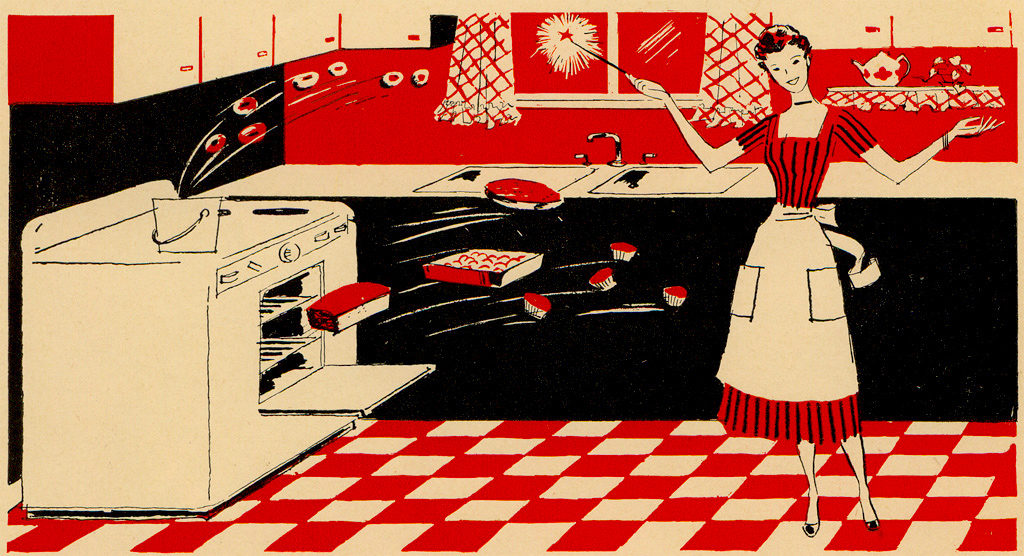Just before I was married, my aunt Melanie gave me a pink three-ring plastic binder filled with the culinary history of my family. It’s essentially a cookbook, filled with recipes from the women on my mom and dad’s sides, and a few from my newly acquired family. Some of the recipes are typed; some are scanned copies of handwritten instructions; some are pages of other cookbooks with notes scribbled around the margins- temperatures crossed out, proportions adjusted. There are a few photos of the finished products on card tables and Christmas buffets. The recipes are attributed, at the bottom, to the family member who created or appropriated them in a little yellow box. Underneath the attributions are field notes: acknowledgments, serving suggestions, words of encouragement, family secrets and folklore.
I tend to read cookbooks with as much an editor’s or historian’s eye as I do a cook’s. Recipes shape-shift and rearrange themselves as they are passed from person to person, becoming something new while still attached to something old. My own writing process has always mimicked my style of cooking: a panicked session of hard-eyed study of a text. Reading, rereading, re-re-reading, researching techniques, ingredients, burying myself in the history of a reference until a plan emerges and inspiration finally rises up from my gut to my hands.
I try to make focaccia for the first time, but it’s too humid in my apartment and it doesn’t rise. The crust bakes a beautiful, golden brown like hay, but it’s hard as a brick and almost chips my tooth. Grudgingly, I make a giant pot of brothy stew so it won’t go to waste. My husband happily chews and swipes the bread through his stew, chattering lovingly, grateful just to be fed, but I know the difference and I sulk.
My own writing process has always mimicked my style of cooking.
The next day, my downstairs neighbor knocks on my door as I am writing a really heartbreaking story that makes me sweat and feel slightly feverish. He is a brewer who brews his own beer in the basement of our building and holds big, festive cookouts in the summer, grilling up Pat LaFreida steaks and corn and baked potatoes. I am up to my elbows in words when he knocks and not just a little annoyed to be interrupted. I open the door and he is holding a loaf of bread. “I had a bunch of spent grain, so I made some sourdough, and way too much of it.” He hands me the loaf, still warm. “How did your focaccia turn out?”
I mutter something about the humidity and yeast. He offers me some of his sourdough starter. “I’ve had it for a few years now. You just have to feed it every few months, but it’s pretty reliable.” I accept his offer and thank him. He’s a really nice guy. I close the door behind him, sit down, and write four more pages in a frenzy, tearing off hunks of warm, tangy bread and devouring them. I eat the whole loaf. It is maddening and perfect.
Only one of my maternal grandmother’s recipes exists in the cookbook. She did not write recipes down. She was the first of ten children, tobacco sharecroppers in Colquitt County,Georgia. Her mother, Leola, worked alongside her husband, planting and reaping whenever she was not pregnant with more free laborers. As the eldest child and her surrogate, my grandmother was responsible for waking up before everyone else and making the huge breakfast that sustained her family’s laboring. Everyone else rose hours later, after the biscuits had been kneaded and baked, the hardtack laid out and the black coffee percolated. She made them pots of greens laced with fatty ham hocks and skillet cornbread. She made all of these things from memory, from improvisation in fallow years, from what her mother or aunts showed her when she was old enough to understand and be taught. Some years later, one of her grandchildren pleaded that she write down her recipe for apple pie. When I try to follow the recipe, I’m bewildered. There are no cook times, only “until bubbling and browned,” no specifics on the thickness of apple slices – the implication being that you should know. This is knowledge we women possess.
This is knowledge we women possess.
After college, my mother had dreamed of becoming a journalist. However, my father’s infidelities became incontrovertible and at 23 years old she found herself heartbroken, divorced while pregnant, with a daughter to raise alone. Her life, as my grandmother’s, would be spent caring for others instead of writing about them. Like my grandmother, she did not complain about providing (or if she did it never reached our ears). She became an English teacher. She worked and fed and taught. I wonder what she could have written if she hadn’t devoted herself to the shaping of young minds, applying heat and fermenting ideas and allowing them to bubble up, golden.
It is impossible for me, when writing, not to consider these women and the things they wrote down and the things they did not write down. I think about a note added to a pound cake by a cousin of my other grandmother’s from Detroit in the ‘40s, the daughter of a marine merchant: “After the cake is in the oven, leave in for 45 minutes and walk softly upon the kitchen floor.” I think about my neighbor and his stupid perfect loaf of bread. I get annoyed and then I get to work. I am much older than I thought I would be when finally able to devote myself to writing. I am not as good as a lot of others much younger and better educated than me. I am not making airy pound cakes or fluffy focaccia. I’m making the dense, short biscuits my grandmother made. I am using all of the butter that is called for and drizzling them with honey.
 Rachel Knox is a writer and student at The New School in New York City. She is originally from St. Petersburg, Florida and writes both fiction and nonfiction. She lives and works in Brooklyn.
Rachel Knox is a writer and student at The New School in New York City. She is originally from St. Petersburg, Florida and writes both fiction and nonfiction. She lives and works in Brooklyn.
Featured image via Flickr.


1 Comment
very useful. Thanks